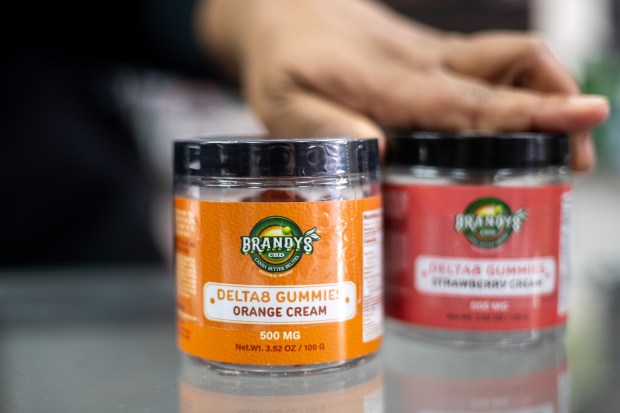Gov. JB Pritzker is calling on lawmakers to crack down on hemp products like delta-8 THC, saying they let minors get high on untested, mislabeled cannabis — but it’s a move which hemp shop owners say would also close legitimate businesses.
The governor came out Friday in support of legislation that would set a minimum age of 21 to buy such products. It would require hemp companies to obtain licenses and test and label their products, similar to the requirements for legal marijuana. And it would ban copycat packaging that looks like common candy or snack brands.
“This regulatory gray area has created a loophole that put Illinois consumers of all ages, but particularly children, in danger while an underground market flourished — the exact opposite of what Illinois has done by regulating our cannabis industry,” Pritzker said. “We’re closing that loophole and protecting Illinoisans of all ages by incorporating these products into the regulated and equitable system of dispensaries already in place in the state.”
But hemp business owners say the restrictions limiting sales to licensed dispensaries and limiting the percentage of intoxicating THC below .3% will put many of these small smoke and vape shops out of business.
Brandy Garner, a nurse and owner of Brandy’s CBD at 87th and King Drive, said patients use her products for relief of pain and other symptoms, and say they can’t find CBD products without THC at many dispensaries. She worried that the proposed regulations might put her out of business.
“Where does that leave us for our products?” she asked. “Do we just pack up and leave? A lot of us have put a lot of money into this.”
The controversy reflects a fight between cannabis business owners, who are licensed by the state, and hemp business owners. Paradoxically, though they are the same plant, cannabis remains illegal under federal law, while hemp was legalized nationally in 2018.
Hemp is defined legally as cannabis having less than .3% delta-9 THC, the component of pot that gets users high. The intent was to legalize CBD, a non-intoxicating part of cannabis. But chemists have found ways to derive from CBD other compounds like delta-8 THC and THCO which do get users high, though users say to a lesser degree than delta-9.
The result has been a nationwide proliferation of smoke and vape shops and gas stations that sell intoxicating products, often without being explicitly licensed to do so.
Since there is no legal age limit in Illinois, the most serious problem has been adolescents being hospitalized from ingesting the drug, as happened this month with three children in Rogers Park who ate cannabis gummies.
State Rep. LaShawn Ford is sponsoring alternative legislation that would also require age limits, testing and labeling, but would license hemp businesses separately, in addition to existing cannabis dispensaries.
He suggested a two-tier sales system where cannabis, which is more potent, would be sold at dispensaries, while lower-potency hemp would be sold at separate locations. To prohibit hemp businesses altogether, he said, would just push sales underground and online, where people already can order home delivery.
Ford said that the bill Pritzker supports would favor cannabis retailers by making them the exclusive sellers of it. Ford also said that putting hemp sales under the exclusive control of cannabis dispensaries puts those dispensaries in control of the market.
The Illinois Healthy Alternatives Association, representing many of the hemp businesses, called on the lawmakers to instead implement sensible regulations, including age and safety measures. The legislation favored by the governor, they say, would eliminate the sale of most hemp products, including CBD.
“It contains myriad technical mistakes and is a full ban whether they call it that or not,” Chi’tiva hemp business owner Charles Wu said. “It bans Illinois’ hemp industry but does nothing to curb online sales to minors from out of state companies.”




